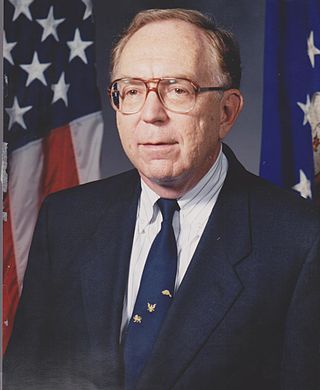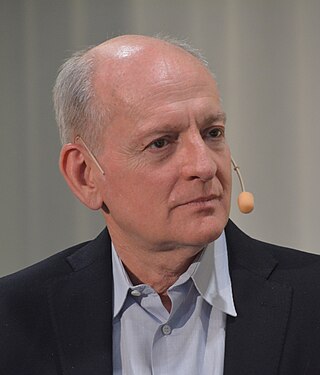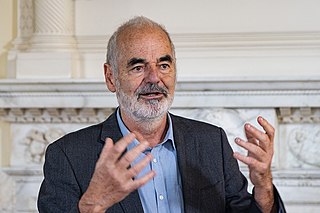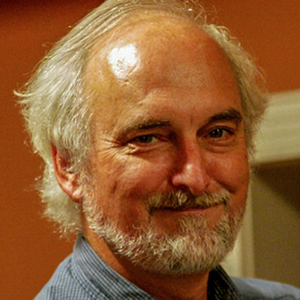
Kevin Warwick is an English engineer and Deputy Vice-Chancellor (Research) at Coventry University. He is known for his studies on direct interfaces between computer systems and the human nervous system, and has also done research concerning robotics.

Edward Albert Feigenbaum is a computer scientist working in the field of artificial intelligence, and joint winner of the 1994 ACM Turing Award. He is often called the "father of expert systems."

John McCarthy was an American computer scientist and cognitive scientist. He was one of the founders of the discipline of artificial intelligence. He co-authored the document that coined the term "artificial intelligence" (AI), developed the programming language family Lisp, significantly influenced the design of the language ALGOL, popularized time-sharing, and invented garbage collection.
Geoffrey Everest Hinton is a British-Canadian computer scientist and cognitive psychologist, most noted for his work on artificial neural networks. From 2013 to 2023, he divided his time working for Google and the University of Toronto, before publicly announcing his departure from Google in May 2023, citing concerns about the risks of artificial intelligence (AI) technology. In 2017, he co-founded and became the chief scientific advisor of the Vector Institute in Toronto.

Peter Norvig is an American computer scientist and Distinguished Education Fellow at the Stanford Institute for Human-Centered AI. He previously served as a director of research and search quality at Google. Norvig is the co-author with Stuart J. Russell of the most popular textbook in the field of AI: Artificial Intelligence: A Modern Approach used in more than 1,500 universities in 135 countries.

Stuart Jonathan Russell is a British computer scientist known for his contributions to artificial intelligence (AI). He is a professor of computer science at the University of California, Berkeley and was from 2008 to 2011 an adjunct professor of neurological surgery at the University of California, San Francisco. He holds the Smith-Zadeh Chair in Engineering at University of California, Berkeley. He founded and leads the Center for Human-Compatible Artificial Intelligence (CHAI) at UC Berkeley. Russell is the co-author with Peter Norvig of the authoritative textbook of the field of AI: Artificial Intelligence: A Modern Approach used in more than 1,500 universities in 135 countries.

Barbara Liskov is an American computer scientist who has made pioneering contributions to programming languages and distributed computing. Her notable work includes the introduction of abstract data types and the accompanying principle of data abstraction, along with the Liskov substitution principle, which applies these ideas to object-oriented programming, subtyping, and inheritance. Her work was recognized with the 2008 Turing Award, the highest distinction in computer science.

Noel Sharkey is a computer scientist born in Belfast, Northern Ireland. He is best known to the British public for his appearances on television as an expert on robotics; including the BBC Two television series Robot Wars and Techno Games, and co-hosting Bright Sparks for BBC Northern Ireland. He is emeritus professor of artificial intelligence and robotics at the University of Sheffield.

Sir David John Spiegelhalter is a British statistician and a Fellow of Churchill College, Cambridge. From 2007 to 2018 he was Winton Professor of the Public Understanding of Risk in the Statistical Laboratory at the University of Cambridge. Spiegelhalter is an ISI highly cited researcher.

John Vogel Guttag is an American computer scientist, professor, and former head of the department of electrical engineering and computer science at MIT. He conducts research on computer networks and medical applications of AI as co-lead of the MIT Computer Science and Artificial Intelligence Laboratory's Networks and Mobile Systems Group.

Timothy Wilking Finin is the Willard and Lillian Hackerman Chair in Engineering and is a Professor of Computer Science and Electrical Engineering at the University of Maryland, Baltimore County (UMBC). His research has focused on the applications of artificial intelligence to problems in information systems and has included contributions to natural language processing, expert systems, the theory and applications of multiagent systems, the semantic web, and mobile computing.
Peter Kyberd is a biomedical engineer specialising in rehabilitation. He is currently head of the School of the Built and Natural Environment at University of Derby. He serves on the editorial board of the Journal of Prosthetics and Orthotics, and the executive board of the national members society of the International Society of Prosthetics and Orthotics (ISPO). His main research activity has been the practical application of technology to rehabilitation and engineering in Orthopaedics. He has chaired both international upper limb research conferences; MEC and TIPS.
Michael Peter Georgeff is a computer scientist and entrepreneur who has made contributions in the areas of Intelligent Software Agents and eHealth.
Informatics is the study of computational systems. According to the ACM Europe Council and Informatics Europe, informatics is synonymous with computer science and computing as a profession, in which the central notion is transformation of information. In some cases, the term "informatics" may also be used with different meanings, e.g. in the context of social computing, or in context of library science.

Stephen P. Boyd is an American professor and control theorist. He is the Samsung Professor of Engineering, Professor in Electrical Engineering, and professor by courtesy in Computer Science and Management Science & Engineering at Stanford University. He is also affiliated with Stanford's Institute for Computational and Mathematical Engineering (ICME).
John Mylopoulos is a Greek-Canadian computer scientist, Professor at the University of Toronto, Canada, and at the University of Trento, Italy. He is known for his work in the field of conceptual modeling, specifically the development an agent-oriented software development methodology. called TROPOS.
Bing Liu is a Chinese-American professor of computer science who specializes in data mining, machine learning, and natural language processing. In 2002, he became a scholar at University of Illinois at Chicago. He holds a PhD from the University of Edinburgh (1988). His PhD advisors were Austin Tate and Kenneth Williamson Currie, and his PhD thesis was titled Reinforcement Planning for Resource Allocation and Constraint Satisfaction.

Bonnie Anne Berger is an American mathematician and computer scientist, who works as the Simons professor of mathematics and professor of electrical engineering and computer science at the Massachusetts Institute of Technology. She is the head of the Computation and Biology group at MIT's Computer Science and Artificial Intelligence Laboratory. Her research interests are in algorithms, bioinformatics and computational molecular biology.

Sir John Michael Brady is an emeritus professor of oncological imaging at the University of Oxford. He has been a Fellow of Keble College, Oxford, since 1985 and was elected a foreign associate member of the French Academy of Sciences in 2015. He was formerly BP Professor of Information Engineering at Oxford from 1985 to 2010 and a senior research scientist in the MIT Computer Science and Artificial Intelligence Laboratory (CSAIL) in Cambridge, Massachusetts, from 1980 to 1985.

Pascal Hitzler is a German American computer scientist specializing in Semantic Web and Artificial Intelligence. He is endowed Lloyd T. Smith Creativity in Engineering Chair, one of the Directors of the Institute for Digital Agriculture and Advanced Analytics (ID3A) and Director of the Center for Artificial Intelligence and Data Science (CAIDS) at Kansas State University, and the founding Editor-in-Chief of the Semantic Web journal and the IOS Press book series Studies on the Semantic Web.














